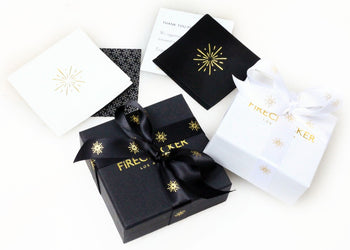
Translation missing: en.sections.article.title:
Designer Spotlight:
Allegory Pens
The Journal
From the Windy City annals of “Teach a man to fish…”
Father makes son wooden pen from scratch. Son cherishes pen. Father teaches son how to make said pen. Soon thereafter, both son & daughter-in-law lose tech jobs when employer goes bust and…
Well, you get the point.
Launched in 2012 by Chicago/Joilet, Illinois-based owners Chad & Jessica Schumacher, Allegory was founded on principles that we here at Firecracker hold dear: namely, creating deeper value in objects we use everyday. Through smart-sourcing of materials and small-batch manufacturing, the duo applied lessons learned from father/in-law Chuck and turned them into a thriving new business handcrafting reclaimed wood pens.

Getting their hands dirty...
Bringing in old college friend Steve Elmore as the first hire, the two started out -- where else? -- in Schumacher’s garage. Both men quickly embraced the down-to-earth aspect of turning planks of reclaimed raw wood into highly functional, gorgeous writing instruments.
Why reclaimed wood? It's all about character. Some of Allegory’s materials are hundreds, if not thousands of years old. To Chad, that incredible history translates into a "timeless, boundless feel… a great source of inspiration".
Take his “Troubador” pen, for instance, made primarily from Sinker Cypress. Before the industrial revolution, loggers would float fresh-cut logs down river to a temporary sawmill.
Oftentimes, logs would sink en-route and get trapped on the bottom. But if enough silt enveloped the wood before rot and erosion set in, all was preserved. Bad news for old-time loggers, good news for the rest of us.

Today, these century-old remnants of pre-industrial America are recovered from the bottom of river beds...
... THE. BOTTOM. As in, previously lost to the world...
...and re-imagined to the creative hilt by the Allegory team.
“Something special happens when a craftsman sets their hands to a piece", Chad says. "The care, dedication, and passion they put into the work becomes part of the object."
Let's face it:
No plastic pen in the world can beat that. Not even close.



